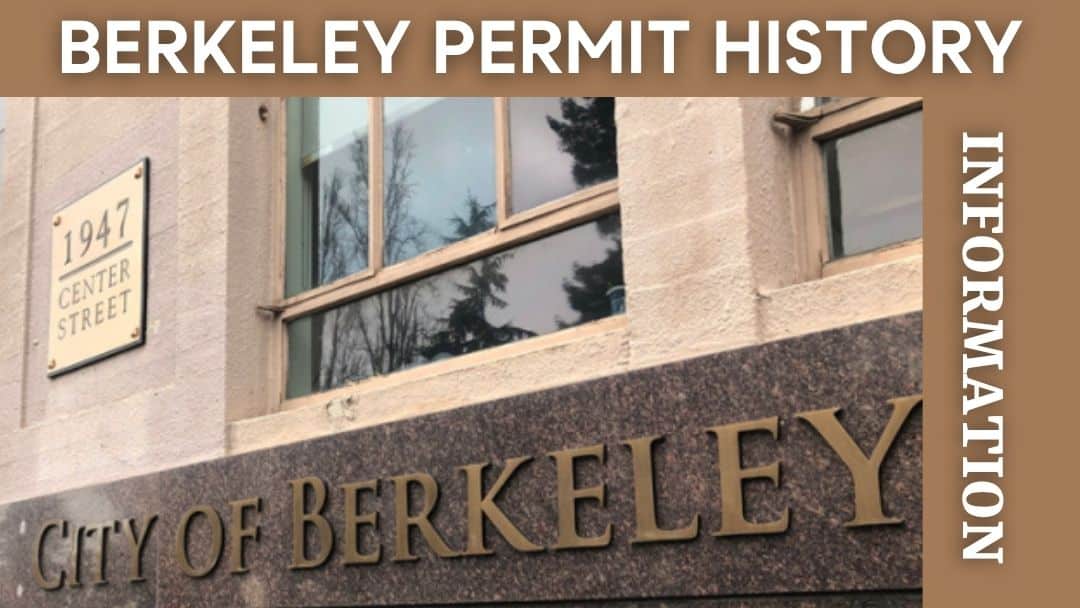When I help clients buy, sell, or renovate a home, one of the steps I often recommend is reviewing the property’s Berkeley permit history. Knowing what work has been legally permitted and inspected for safety compliance can make a huge difference in understanding a property’s true condition, value, and potential resale implications.
Why Checking Permit History in Berkeley Matters
A property’s permit history provides a clear record of improvements, repairs, and modifications over time. In Berkeley, major systems such as electrical, plumbing, HVAC, roofing, and structural work should have corresponding permits from the City. Unpermitted work can lead to liability issues, insurance challenges, or resale complications.
For sellers, reviewing the permit history early helps avoid surprises later. For buyers, it confirms that upgrades were completed safely and to code. And for homeowners planning future work, it ensures your projects comply with City of Berkeley building regulations—preventing fines or costly retroactive fixes.
Step 1: Use the City of Berkeley Permit Search Portal
The easiest way to find permit information is through the City of Berkeley Citizen Portal: https://aca-prod.accela.com/BERKELEY/Default.aspx.
This online database allows anyone to search for building, electrical, plumbing, and mechanical permits. Here’s how:
- Click Building Permits from the homepage.
- Scroll down to the General Search section.
- Enter the property address (street number and name are usually enough).
- Review results for permit type, issue date, status (issued, finaled, expired), and scope of work.
If you can’t locate a record, try slight variations of the address or parcel number (APN). Note that permits prior to 2015 may not be digitized yet. Just because the online permit search doesn’t result in the information you are looking for, doesn’t mean the permits don’t exist.
Step 2: Review Each Permit’s Details
Each record provides valuable information:
- Permit Number – reference for contacting the city.
- Status – whether the work is open, finaled, or expired.
- Scope of Work – summary of the project.
- Contractor or Owner-Builder – who performed the work.
Some listings even include downloadable PDFs of inspection notes or final approval reports. Always review these to verify whether work was properly completed and closed out. For older permits, you may see multiple instances of the same permit with a letter at the end of the permit number (it may be P for plumbing, E for electrical or M for mechanical). These are all the same permit and there will typically only be a single ‘Finaled’ permit.
Step 3: Find Older or Missing Records
Permits issued before the mid-1990s often aren’t available online. Also, the online permitting system was updated in 2015 and some data from the old system was not transferred to the new platform. To find historical files:
- Fill out a record request form from https://berkeleyca.gov/sites/default/files/2022-02/Records_Retrieval_Request_112117.pdf. If you request email reports there will be no charge. Printed reports cost $0.10 per page. Also, files before 1993 are stored on microfiche so make sure to check both the Records Request AND Microfiche Request fields on the form.
- In the Record Request Details section, check ‘Building Permit Records’. Note that building plans will not be released to non-owners without formal written permission.
- Email buildingandsafety@cityofberkeley.info or call (510) 981-7440.
- Provide the full property address or assessor’s parcel number (APN).
- Request digital copies or schedule an appointment to view physical records at the Permit Service Center (1947 Center Street, 3rd Floor).
If work was completed decades ago without documentation, you can apply for a retroactive permit (sometimes called a legalization permit) to bring the property into compliance.
Step 4: Not All Unpermitted Work Is a Problem
Not every unpermitted improvement should cause concern. Many Berkeley homeowners complete minor updates—like replacing light fixtures, refinishing floors, or updating kitchens—without formal permits. Even larger remodels are sometimes done to code but never officially documented.
The real concern arises when square footage is added without a permit—such as a bedroom expansion or garage-to-ADU conversion. In these cases:
- Appraisers won’t count unpermitted square footage in the property’s valuation.
- Non-permitted ADUs can’t be legally rented.
- Lenders and insurers may consider unpermitted additions high risk.
When advising clients, I help distinguish between cosmetic updates and unpermitted structural changes that could impact value, financing, or future saleability.
Step 5: Check Other City Departments
For a complete picture, check with related Berkeley departments:
- Planning Department – zoning changes, variances, ADUs.
- Public Works – sewer lateral compliance and replacements.
- Environmental Health – tank removals or environmental remediation.
- Amnesty Program for Unpermitted Dwelling Units – A pilot program to allow for retroactive permitting of ADUs.
Cross-verifying across departments ensures you don’t miss critical compliance information.
Step 6: Apply Your Findings to Your Real Estate Strategy
For buyers, permit records help evaluate renovation quality and risk. If a remodel lacks a finaled permit, it may influence your offer price or contingency strategy. For sellers, gathering documentation or resolving open permits before listing increases buyer confidence and smooths escrow.
Final Thoughts
Navigating the City of Berkeley’s permit records can be time-consuming, but doing so builds confidence and protects your investment. Whether you’re buying, selling, or renovating, understanding a home’s Berkeley permit history helps you make smarter, safer, and more informed real estate decisions.
If you have questions about Berkeley property permits or how unpermitted work might affect your home’s market value, feel free to contact me directly. While I’m not a permit expert, I can help you interpret the implications of your property’s permit history and strategize around disclosures, pricing, and buyer expectations.




